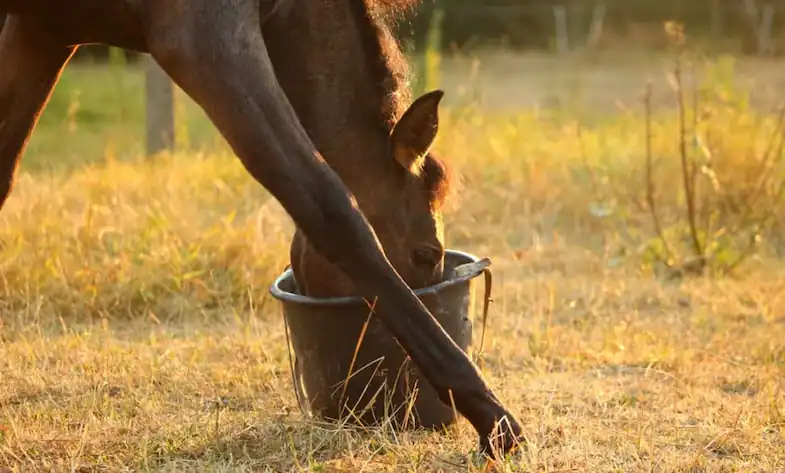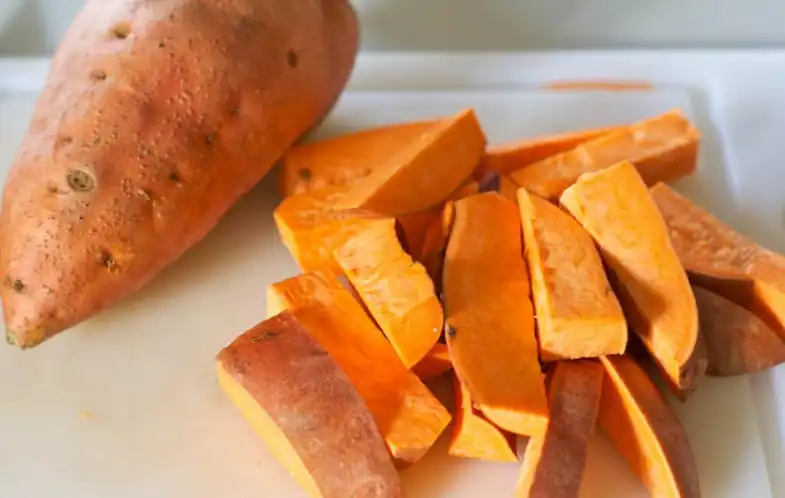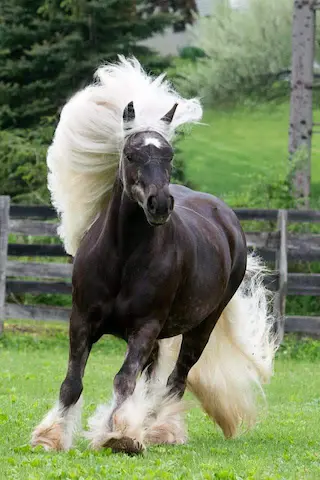I don’t know about you but I like to feed my horse different treats, I always think that if I’m feeding him the same thing all the time it’s not really a treat. Over the years I thought I’d tried everything but when somebody recently suggested I tried feeding sweet potatoes I realized I hadn’t at all. With this in mind, I decided to do a little research, after all, I didn’t want to go and feed my horse something that would harm him. While I knew normal potatoes are toxic I was surprised with what I found about sweet potatoes.
Can horses eat sweet potatoes? Sweet potatoes (or yams as they’re sometimes called) are perfectly safe for horses to eat and are also a great source of vitamins (Vitamins A, C, and E in particular). On top of that, they can help to heal gastric ulcers. They’re high in sugar and starch so should only be fed in moderation though.
If you’re worried about feeding sweet potatoes to your horse because you’ve heard that they’re a member of the nightshade family don’t worry, while normal potatoes are part of the family, sweet potatoes aren’t from the same family at all. They’re actually from the morning glory family (nothing to do with the Oasis album ‘What’s The Story Morning Glory’), that also contain yams and water spinach, and are not only safe for your horse to eat but can also have a number of health benefits, not least helping to treat gastric ulcers.
What are the nutritional values of sweet potatoes?
Both the nutritional values and the vitamins and minerals in the tables below are based on a 124g serving of raw sweet potato.
| Calories | 108 |
| Protein | 2g |
| Fat | 3g |
| Carbohydrates | 18.7g |
| Sugar | 6.77g |
| Fiber | 2.48g |
| Sodium | 306mg |
| Water | 77% |
| Vitamin A | 823mcg |
| Vitamin C | 12.8mcg |
| Vitamin K | 5.1mcg |
| Beta-carotene | 9,470mcg |
| Calcium | 50.8mg |
| Iron | 0.7g |
| Magnesium | 19.8g |
| Potassium | 259mg |
Are sweet potatoes healthy for horses?
The term ’superfood’ is one of those things that’s banded around a lot these days, often without cause, but when it comes to sweet potato there’s a good reason why they should wear their superfood badge with pride. Yes they do contain sugar (at around 4.2g per 100g of sweet potato it’s less than you’d find in a carrot), but the other nutrients certainly make up for the sugar, and anyway, horses need a certain amount of sugar in their diet.
On top of protein and dietary fiber sweet potatoes also have a very good selection of vitamins and minerals:
- Vitamin A – As well as boosting your horse’s immune system and strengthening his bones, Vitamin A can also help to reduce the risk of cataracts.
- Vitamin C – Like Vitamin A, Vitamin C can help to improve your horse’s immune system but it can also help to heal wounds and keep your horse’s teeth, bones, and cartilage healthy.
- Vitamin B5 – Part of the B complex vitamin group, Vitamin B5 can help to keep your horse’s coat in good condition. It also works to aid digestion, especially in the digestive tract.
- Vitamin B6 – Another B complex vitamin, it’s known for its ability to reduce the symptoms of some forms of arthritis as well as keeping the eyes healthy. If your horse suffers from depression then Vitamin B6 can help with this.
- Vitamin E – Known for its ability to fight infection, Vitamin E also works to maintain healthy skin, eyes, and even a healthy coat.
- Potassium – You might not realize it but potassium is actually one of the most important minerals in the body, it works to keep a horse’s muscles working properly and will also help to reduce tiredness after exercise.
- Manganese – Not only does manganese help to keep your horse’s bones strong and healthy but it can also reduce inflammation. In my opinion, though the biggest role that manganese plays is in the regulation of blood sugar, this means that it may be good for horses that suffer from conditions such as Equine Cushing’s Disease.
As you can see sweet potatoes are very healthy for horses, but like all treats, they should be fed in moderation and as part of a proper and balanced diet.
Can horses eat sweet potato peelings?
Every part of the sweet potato is safe for horses to eat but while some horses won’t like the taste of the roots or leaves most will love the peel (or skin) which is a good thing because the peel is actually healthier than the flesh. While the whole sweet potato is packed full of goodness, the peel itself actually contains almost double the number of antioxidants than the vegetable which means that they’re not only a tasty treat but a healthy one too.
As well as bursting with antioxidants the peel is a great source of dietary fiber so will help to keep your horse’s digestive system in tip-top condition which can also help to prevent colic.
Should horses eat cooked or raw sweet potatoes?
Most people will say that you should feed sweet potatoes raw, and while that’s obviously the easiest thing to do it doesn’t mean that you can’t cook them before feeding them to your horse, it’s down to your horse’s personal preference really – both are just as good.
Personally, I prefer to feed them raw because I can cut them into slices or wedges and then either leave them in the feed room or carry them in my pocket while out riding.
How do sweet potatoes treat stomach ulcers?
If you search the internet for the best way to naturally treat ulcers you’ll probably find a list of herbal remedies that really do work but what might surprise you is that many of those remedies can be found in sweet potatoes which is why feeding just one sweet potato a day can completely heal many ulcers (they can also help with a number of other gut and bowel issues too).
- Methanol – Found in the roots of sweet potatoes it’s known to help protect gastric tissue against peptic ulcers and those caused by prolonged use of NSAIDs (non-steroid anti-inflammatory drugs).
- Flour – Again found in the roots of the vegetable, it’s known to suppress gastric ulcers by reducing the swelling around the tissue as well as reducing gastric wrinkles.
- Vitamin A – As well as helping to prevent ulcers in the first place, Vitamin A also works to shrink the ulcer and thus speeding up the healing time.
- Vitamin C – While we all know that Vitamin C can help to prevent colds, it’s not so widely known that it also works to repair wounds, including peptic ulcers.
- Beta-carotene – This won’t prevent ulcers but it will help to reduce the severity of symptoms as well as boost the effectiveness of any prescribed treatment.
Sweet potatoes are so good at treating ulcers that some veterinarians may even prescribe them, even if only as a way of boosting conventional medicines such as omeprazole.
Can sweet potatoes change the color of my horse’s coat?
While nobody would claim that feeding sweet potatoes changed their horse’s coat color some owners have reported that it has altered the shade of their coat. Now I know this may sound like an old wive’s tale but there is actually some evidence that, depending on your horse’s coat color, feeding them a sweet potato every day will darken the color. This is more common in horses that are brown, bay, chestnut, and sorrel, or at least would be if they didn’t have any dilution genes.
The reason for this is that sweet potatoes are high in copper (out of all vegetables they actually contain the second-highest levels of copper), a mineral that’s known to not only help the condition of the skin but is also used in the production of melanin. It’s the melanin that gives the skin pigment its color and tone, so when this is boosted with a regular supply of extra copper it stands to reason that your horse’s coat will darken slightly.
Don’t worry if you don’t like your horse’s new coat color though, it’ll return to normal pretty quickly after you stop feeding sweet potatoes every day.
Further reading
- Are bananas safe for horses?
- Can horses eat watermelon?
- Are horses okay eating Christmas trees?
- Can horses eat pumpkins?
- 20 fruits your horse will love
- What you should feed your horse
- Dos and don’ts of feeding treats
- Surprising things your horse should eat
I hope you found this article helpful. If you did I’d be grateful if you could share it please as it would really help me.
Recommended products
Over the years I have tried hundreds of different horsey products, from various blankets and halters to different treats. Some I’ve loved, others I’ve hated but I thought I’d share with you my top all-time favorite products, the ones I never leave the yard without. I’ve included links to the products (which are in no particular order) that I really think are great.
- Horse Knots by Reference Ready – If you’re like me and enjoy pocket reference guides then you’ll love this knot tying guide. These handy cards can easily fit in your pocket or attach to the saddle for quick reference. They’re waterproof, durable and are color coded to make them easy to follow.
- Mane ’n Tail Detangler – Even if you never show your horse you’ll need to detangle his tail from time to time (and possibly his mane too) which is always a challenging chore! I’ve found that if I run a little bit of detangler through my horse’s tails every few days it stops them from getting matted up and makes combing them easy, even if they’re coated in mud. I don’t know if I should admit to this or not but it also works wonders on my hair.
- TAKEKIT Pro clippers – Over the years I’ve tried a lot of different clippers and while some were obviously better than others I found these to be by far the best. They are heavier than a lot of other clippers but for me, that’s a good thing, it makes them feel more sturdy and hardwearing. On top of that they have a range of speeds so are just as good for clipping your horse’s back as they are his face. I also like the fact that they come in a handy carry case but that’s not for everybody. The company that makes them is super good and incredibly helpful too, a real bonus these days. The only thing I wasn’t keen on was the fact that it doesn’t come with any oil, but that’s not a major problem as it’s not difficult to buy lubricant.
- Shire’s ball feeder – There are so many boredom buster toys out there but I like to use these every day, regardless of whether or not my horses are bored. I find that it helps to encourage my horses to problem solve by rewarding them with treats (or pieces of fruit) but it also mimics their natural grazing behavior which helps to keep them calm and de-stressed.
- Horse safe mirror – This is a strange one that many people are surprised about but I like to put horse safe mirrors in the trailers as well as in the quarantine stalls. It helps to prevent the feeling of isolation by giving the impression of other horses being around. Being herd animals horses can get extremely stressed when they feel that they’re on their own but with these stick-on mirrors, they believe that at least one other horse is with them.
- Rectal thermometer – I know this isn’t glamourous at all but it’s vital for your horse’s well-being to be able to check their temperature and a rectal thermometer is the easiest way of doing this which is why I’ve added it to the list.
Shopping lists
I’ve also put together a few shopping lists of essential items that I’ve found helpful over the years. I’ve broken the lists down into different categories rather than put everything in one massive list 😉




